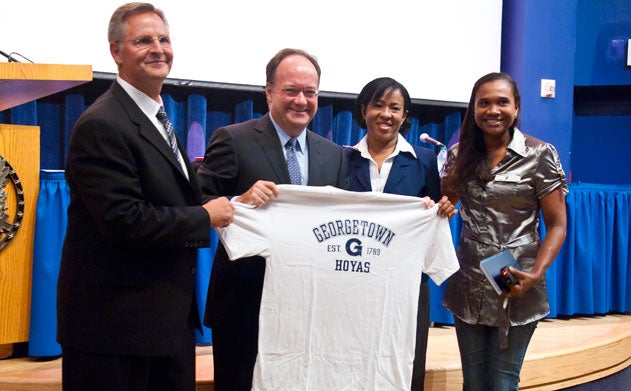Title: New Trademark Licensing Policy Aims to Protect Workers in Bangladesh
Georgetown announces that it will require all University trademark licensees that source, produce or purchase collegiate apparel from Bangladesh to sign an agreement protecting garment workers.

– Georgetown announced today thatit will require all of its university trademark licensees that source, produce or purchase collegiate apparel from Bangladesh to sign a new legally binding agreement designed to protect the lives of garment workers in the country.
The agreement the Accord on Fire and Building Safety in Bangladesh – includes independent safety inspections at factories and public reporting of the inspection results.
“Georgetown University is committed to protecting the safety and human rights of workers who are involved in producing apparel with Georgetown insignia,” said President John J. DeGioia. “The Accord on Fire and Building Safety in Bangladesh is a groundbreaking development. It holds great promise for improving the workplace safety of garment workers in Bangladesh and for ensuring that Georgetown licensed apparel is not produced in dangerous workplaces.”
Safety Crisis
DeGioia accepted the recommendation to adopt the new policy from the university’s licensing oversight committee, which was established in 2000 to advise on labor conditions within factories producing apparel and other products bearing Georgetown’s name and logos. Its members include students, faculty and staff.
“I wish to thank the members of the licensing oversight committee for their work on this important issue,” said DeGioia.
Bangladesh is the world’s second largest apparel exporter with more than 3,500 factories and 3 million workers who face a serious workplace safety crisis.
Two of the worst disasters in the global apparel industry’s history recently occurred in Bangladesh.
In November 2012, a fire at the Tazreen Fashions factory caused the deaths of 112 workers, and 1,132 workers died after the Rana Plaza factory building collapsed last April.
A New Framework
Local and international trade unions, global apparel brands and nongovernmental organizations have come together to develop a new framework for regulating fire and building safety in apparel factories following the Rana Plaza disaster.
As a result, more than 120 apparel companies have signed the Accord on Fire and Building Safety in Bangladesh.
Four Georgetown licensees have signed the accord to date: Knights Apparel, Russell Athletics (through its parent company Fruit of the Loom), Top of the World and Zephyr.
Under the terms of the accord, apparel company signatories agree to:
Require factories to submit to thorough, independent inspections with full public reports.
Ensure that factories undergo all necessary renovations with funding provided by the brands as needed through loans or direct payments.
End business relationships with any factories that refuse to undertake necessary renovations.
Make a two-year commitment to remain in factories from which signatories currently source to make sure necessary remedial measures are taken.
Ensure a central role for workers and unions, including union access, the formation of occupational health and safety committees and the recognition of a worker’s right to refuse dangerous work.
Action and Commitment
The Worker Rights Consortium (WRC), an independent labor rights monitoring organization of which Georgetown is a founding affiliate, has supported the implementation of the accord.
Scott Fleming, associate vice president for federal relations and a member of the licensing oversight committee at Georgetown, serves on the WRC’s Governing Board.
“Having served on the Licensing Oversight Committee for more than a decade and as a current member of the Workers Rights Consortium Board, I am certain that this decision is the right one for Georgetown,” said Fleming. “Standing up for the rights of workers who produce garments with Georgetown’s name and insignia has long been a priority on our campus for students, faculty, and the University’s leadership. This action reflects that commitment.”